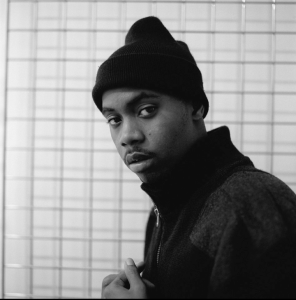“Pac was like Jesus; Nas wrote the Bible” -J.Cole, Let Nas Down
by Roberta Nin Feliz
 After Tupac and Biggie, the East Coast rapper Nasir
After Tupac and Biggie, the East Coast rapper Nasir
Jones, the son of blues and jazz player Olu Dara, became one of the most
respected writers/performers in hip hop history. When “Nas” is
writing and rapping at the top of his game, his music can be a mind-blowing
experience.
I was initially so disoriented by the sinister introduction to “I Gave You Power,” that I didn’t realize at first that Nas was telling the life story of a gun in this song. I remember thinking to myself: “Where is Nas going with this?…” when the suspense made me so intensely curious, that his lyrics transported me completely into the song. Suddenly, I had become the gun Nas was describing, and he became the owner. I felt the strong, calloused hands of a shooter grab me and take me on a strange journey through gruesome murders and lonely nights. I saw the look of revenge on the owner’s beat-up face as he came in, and reached for me, towards the end of the song. I remember feeling a sense of regret when I purposely jammed so the owner couldn’t shoot me. Then I felt relieved, yet apprehensive, as my owner lay with his brains all over the concrete as the song’s finished.
Just as I’m about to regain my composure, Nas hijacks my mind again when “Watch Dem N*****” starts up and sucks me into the next episode of an Odyssey immortalized on his album It Was Written. This CD set a poetic standard for hip hop that many newer artists are still striving to attain. J.Cole, one of today’s most innovative rappers, must have been Nas’s gun as well because he writes a song expressing his gratitude for the almighty Nasir bin Olu Dara Jones.
One proof of how influential Mr. Jones became for Mr. Cole shows up on Cole’s sophomore album, Born Sinner. A track entitled “Let Nas Down” allows Cole not only to confess his inner conflicts with trying to make it in the music industry, but also to speak about wanting to make Nas-his role model-proud. If you are wondering why any young, competitive or ambitious emcee might want to make some older, already successful rap star proud, the reason is simple: genuine respect. Nas’s vivid and lyrical story-telling, his rhythmic flow, and the undeniable authenticity of his subject matter, has won him legions of fans around the world, including me.
The first time I ever heard a Nas song was during my 6thgrade Social Studies class. Our teacher had decided to play the song “I Can” because of Nas’s reference to the ancient African city of Timbuktu. As he walked over to the computer, to my surprise I heard a funky beat start up! I’d expected a boring presentation or video clip, so my ears were pleasantly surprised to hear a piano riff instead. Before I knew it, almost everyone in my classroom began singing, “I know I can be what I wanna be.” Before that, I never knew that rappers even knew about history, let alone spoke about it in their songs. I just thought that hip-hop was supposed to be “gangster” music.
It would be a couple more years before I began to really dig Nas, but I’ll never forget the impact his music had on my childhood. Along with “I Can,” I also remember “If I Ruled the World” and “Nas is Like” as being the unofficial anthems of those hot summers I spent getting wet in the fire hydrant outside my building. Compared to the admiration I feel for Nas, I find it hard to appreciate many rappers of today. Not only do I find something missing from the quality of their recordings, but with the exception of Kendrick Lamar, J.Cole and a few others, I don’t see much to admire about these rappers. Very few of the things they talk about are appealing or even interesting to me. A typical example of this is Chief Keef. Although his songs may be catchy or danceable, I can hardly understand what he “raps” about half of the time. His lyrics don’t seem to have any real substance or emotion to them. For Chief Keef, being a rapper may just be a job. However, for a rapper like Nas, rap is art.
Too much of today’s hip hop is only party music. When DJ Kool Herc tried something new on his turntable back in August 11 of 1973, he was trying to help bring people together by extending the time they had to dance to a favorite single or drum break. That simple experiment marked the birth of “hip hop” at 1520 Sedgwick Ave in the Bronx. But ever since then, hip hop has pioneered a global cultural movement attempting to change the thinking of future generations. Innovative rappers rapped about injustice, politics, racism, sexism, the hood etc. Hip hop served as a tool to unite people and elevate their spirits and aspirations.
Hip hop at its best is fine art, with artists like Nas aspiring to the role of a Picasso or a Van Gogh. Unfortunately, most of the sounds being blasted at parties today fall short of that creative ideal. This shortage of truly clever, thought-provoking new rap material makes me wish I could go back the days when Biggie Smalls was still alive and making hit singles for the radio.